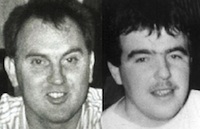
An inquest jury has shocked human rights groups in the North after it ruled that the execution of an IRA Volunteer by British soldiers as he lay dying on the ground was “reasonable”.
Dessie Grew was shot dead alongside fellow IRA man Martin McCaughey when soldiers from the British Army’s murderous SAS (Special Armed Services) ambushed them outside farm sheds near Loughgall, County Armagh, in October 1990.
Neither Grew nor McCaughey fired a shot.
Their deaths were seen as an example of the shoot-to-kill policy of targeted political killings and assassinations by the Crown forces. The mens’ families have campaigned for an inquest for 22 years.
An inquest jury found on Wednesday that the SAS unit shot the two masked men because they believed that their own lives were “in danger”.
The men were shot more than 30 times by the SAS soldiers. Dessie Grew was shot 22 times with wounds to his heart, lungs, liver, kidney, ribcage and diaphragm. Martin McCaughey was shot ten times.
One soldier fired two shots at Mr Grew as he lay dying. The jury said the soldier “felt under threat” because Grew made a noise and moved. They said the soldier’s decision to fire the shots “was reasonable”.
The jury also believed the SAS claims that they were just watching the sheds, which contained weapons and a stolen car, and that the presence of the IRA Volunteers had been unexpected. It also decided the two victims had put their lives in danger by being near the sheds.
However, the jury could not agree whether the soldiers could have arrested the two men.
MARSHALL INQUEST GOES AHEAD
However, there was some positive news in that an inquest into the 1990 shooting of former republican prisoner Sam Marshall is to proceed.
Reversing a recent decision to shelve the case, Coroner John Leckey opened the inquest this week. It followed an apparent change of heart by the Police Ombudsman’s office, who have said they are not carrying out an investigation into the killing.
Allegations of Crown force collusion in the high-profile murder escalated recently after a review of the case revealed that eight undercover British troops were at the murder scene in Lurgan, County Armagh, at the time of the gun attack by a loyalist death-squad.
The relatives, who were gathered in the court on Thursday, had secured a letter from the ombudsman confirming the police watchdog was unable to investigate the British army and was unable to force former or retired police officers to give evidence, which lawyers said barred any effective scrutiny of the new revelations in the Marshall case.
Mr Leckey said he would now begin the process of seeking disclosure of information from the security forces.
“There are three things then,” said the coroner, “disclosure from the chief constable, disclosure from the MoD [Ministry of Defence] and an interrogation of the Stevens [collusion inquiry] archive to see what it contains.”
Mr Marshall’s sister Fra McCaughey said the family had been disappointed by the coroner’s initial decision to await an investigation by the ombudsman, but they welcomed the steps now being taken to begin inquest proceedings.
“It is a lift for the family,” she said. “We are getting somewhere now hopefully.”
![[Irish Republican News]](https://republican-news.org/graphics/title_gifs/rn.gif)
![[Irish Republican News]](https://republican-news.org/graphics/title_gifs/harp.gif)

